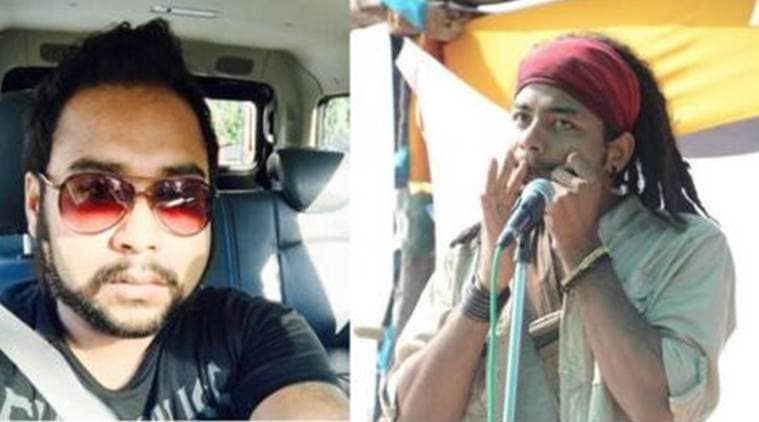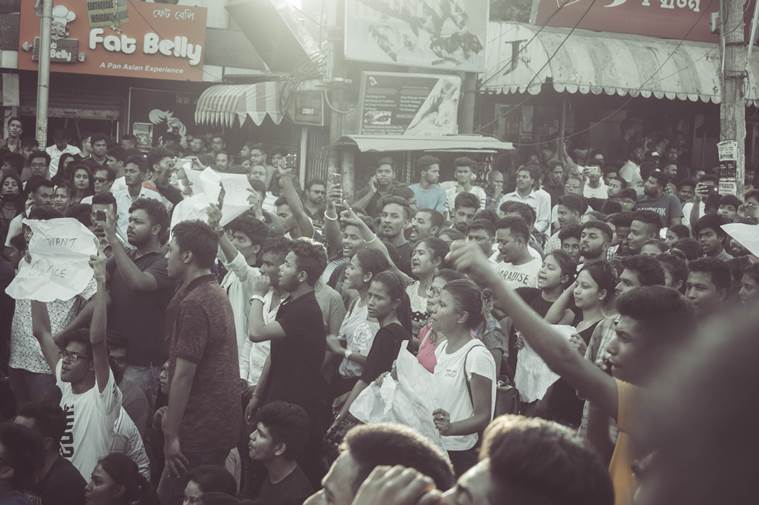 The vehicle used by the victims at Dokmoka police station in Karbi Anglong. (Photo: Abhishek Saha)
The vehicle used by the victims at Dokmoka police station in Karbi Anglong. (Photo: Abhishek Saha)
Shattered glass on the road, blood stains on a bamboo fence and a pall of gloom is what remains at the picturesque Panjuri Kachari village in Assam’s Karbi Anglong district. A day after two men from Guwahati were lynched after locals suspected they were child abductors, the village is desolate and most young men have left fearing police action.
After the lynching, police arrested 15 people — nine from Panjuri Kachari and six others from four adjoining villages. A resident of Diphu town has also been held for “spreading fake news” and rumours of alleged child abductors on a Facebook page which has thousands of followers.
The two victims — Abhijit Nath and Nilotpal Das — travelling in a black SUV, were stopped at about 7.30 pm Friday mere minutes after rumours spread that two men had kidnapped a child and fled in a black car. Locals say the rumours spread through phone-calls that allegedly originated from Kangthilangso, a neighbouring village where Nath and Das visited a waterfall earlier.
The rumours were short: “Puwali aase garir bhitorot (There is a kid inside the car).” But enough to get angry young men from Panjuri Kachari together to stop and check the SUV.
Police officers confirmed that they were looking into the phone calls and messages used to spread misinformation. In some villages, there were even vigilante groups of young men who kept guard at night against “suspicious activities”.
 Nilotpal Das (right) and Abhijeet Nath were brutally killed by a mob on Friday.
Nilotpal Das (right) and Abhijeet Nath were brutally killed by a mob on Friday.
Locals, who had surrounded Nath and Das demanded they open the doors and get out, said a 55-year-old woman who lives near the spot where they were lynched. Her elder daughter, in her late 20s, says she heard shouts of “open the door” and “child abductor” before the brutal assault began.
The crowd, she said, kept growing and more and more young men from neighbouring villages joined in. Some tried to stop the “tamasha”, she said, but were shooed away by others.
“It seems people called their friends in neighbouring villages and said that a child abductor has been caught. People walked or travelled on bikes to join in, and in my opinion, the crowd strength was at least 500 at one point,” said a 65-year-old eyewitness. Police officers confirm that men from several adjoining villages had joined the mob.
Soon, Nath and Das were dragged out of the SUV, and the mob thrashed them with sticks, as others in the crowd kicked them repeatedly even as they pleaded that they were Assamese in an attempt to convince the mob the stop. In a video, Das is seen screaming, “I am Assamese”, and telling the mob his parents’ names to try and stop the assault.
 The protests, which started around 4 pm, turned violent towards the end. (Express photo by Shaunak Bordoloi)
The protests, which started around 4 pm, turned violent towards the end. (Express photo by Shaunak Bordoloi)
Residents who nearby said that mob continued to assault the men even after they found no abducted child in the car. The shattered vehicle Das and Nath were travelling in now lies at a corner in the Dokmoka police station.
“The saner voices were drowned out by those in the mob who were determined to keep hitting them. Some tried to tell them to stop, but were pushed away,” says a 30-year-old eyewitness, who is afraid of being picked up for questioning. “I don’t understand… if they checked and found no child in the car, as the rumours suggested, then why go on with the violence.”
By the time police reached, about 90 minutes later, Nath had collapsed and Das was barely alive. They were rushed to a hospital where they were declared dead.
Dokmuka police station got a call at 8.42 pm and Khowbung and his men rushed to the spot 18 km away and also called an ambulance. “When we arrived there was a crowd of around 250 people and we saw the two very injured persons. They were bloodied and we rushed them to the nearest primary health centre,” says J S Khowbung, the officer-in-charge.
 Condolences and cries for justice have been flooding social media since the news broke on Saturday morning. (Express photo by Shaunak Bordoloi)
Condolences and cries for justice have been flooding social media since the news broke on Saturday morning. (Express photo by Shaunak Bordoloi)
The woman who saw the attack says: “What has happened is extremely sad. We have been crying since that night. Locals were suspicious of the two men because no one travels in a car through this area late in the evening, particularly when panic about child abductors has spread.”
According to Khowbung whose jurisdiction the area is under, the lynching was the culmination of fearmongering over a week in the region about alleged child abductors. The rumours, he said, passed as word of mouth and also through posts on Facebook and social media. Khowbung confirmed that no child abduction has occurred in the area recently and that it was all part of fear psychosis.
 On Sunday chief minister Sarbananda Sonowal held a high-level meeting at his official residence in Guwahati. (Express photo by Shaunak Bordoloi)
On Sunday chief minister Sarbananda Sonowal held a high-level meeting at his official residence in Guwahati. (Express photo by Shaunak Bordoloi)
Panjuri Kachari is home to just 90 families mostly from the Kachari tribe and is the only Kachari-majority village in a cluster of 25-odd Karbi-majority villages in the region. The transformer at the village has been dysfunctional for over two months now and villagers say most houses use solar-powered lanterns and non-electrical hand-held fans. Many residents say they can use mobile phones only after charging the devices at other villages or towns.